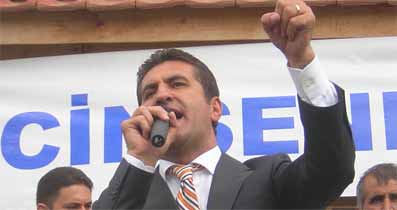Baskaya, author of "The Failure of Paradigms", a book on Kemalism, says that "there is no basic ideological difference between the CHP and the MHP".
"The real owner of nationalism is the CHP. It is the continuation of autocracy, a part of the state. It is not a typical bourgeois party, but part of the state."
He says that some characteristics of the CHP are:
* The CHP does not have to come into power. It is always in power
* Because it terms itself the "centre-left", it blocks the way for a socialist movement
* It is used as an antidote to the religious reactionary movement controlled by the state
Baskaya defines the CHP as the "real state party", which increases its influence by using the General Staff, the National Security Council, the Constitutional Court, the Bar Association and the Cumhuriyet newspaper.
The "Republican rallies" which took place all over Turkey in the summer represent for Baskaya those who want collaboration between the CHP and the MHP.
The USA, Europe and capitalists do not want this, however. The AKP has been an ideal party for the neoliberal globalization.
Baskaya sees the CHP as a continuation of the Ottoman elite, which does not want to be held to account. Issues such as neoliberalism, the EU negotiations, and the Kurdish and Islamic movements are beyond its scope and threaten it.
The CHP has reacted with a discourse of the loss of laicism, the threat of reactionary movements and the occupation of the country as a means of instilling fear in the public.
Real danger is fascism
Sarisozen, a former leading figure in the Turkish Communist Party (TKP) and the Turkish Workers' Party (TIP), describes himself as a democrat but agrees that there is a collaboration between CHP and MHP.
"Although sharia has never been a concrete threat in the Republican period, those that fear it seek protection in the fascist powers which have raised their heads many times. What is the real danger? Sharia or fascism?"
Turkey is not oppressed
According to Sarisozen, those who shelter in nationalist movements are really giving in to fascism. He also criticises the widely-current discourse of Turkey as an oppressed country:
"Turkey today is a regionally imperialist country; collaborating with imperialism it threatens people in the region. There is a race between the imperialism of Turkey and that of others."
"Just like the European social chauvinists targeted not their own bourgeoisie but that of 'enemy countries' during the First World War, Kemalists today are calling themselves social democrat."
"Selcuk does not oppose imperialism"
Sarisozen points to the paradox of journalist Ilhan Selcuk of the Cumhuriyet newspaper, who was tortured in the aftermath of the military coup of 1980:
"He does not oppose the imperialism in his country, which makes him a nationalist. When Selcuk was tortured, he did not confess, he resisted. But now [as a journalist] he finds himself making the statements that his torturers wanted". (TK/AG)




